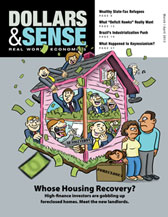
Ignore-rents Is Not Bliss
Review of The Price of Inequality: How Today’s Divided Society Endangers Our Future
by Joseph Stiglitz. W.W. Norton, 2012.
This article is from Dollars & Sense: Real World Economics, available at http://www.dollarsandsense.org

This article is from the March/April 2013 issue of Dollars & Sense magazine.
Subscribe Now
at a 30% discount.
Many of the basic facts about rising income inequality in the United States since 1980 are well known. The top 0.1% got filthy rich. The top 1% has done well. The middle class has shrunk, and the poor are poorer and more numerous. Anyone wanting to understand these changes should read The Price of Inequality by Joseph Stiglitz, a Nobel laureate, former World Bank chief economist, former chair of the Council of Economic Advisers, and now a Columbia University professor. As the title suggests, the book’s main focus is the cost of rising income inequality.
Shifting 5% of national income from the middle and bottom to those at the very top, who will save more of it, Stiglitz argues, reduces economic growth by around 2 percentage points annually. When productivity is a team effort, and some team members are paid enormously more than others, efficiency suffers, since people are unwilling to work hard to enrich someone else. Efficiency also takes a hit since, in Stiglitz’s words, “Alienation has begun to replace motivation.” Badly treated and poorly paid workers put in the least possible effort. Finally, the irresponsible lending and speculation that has led to rising inequality also generates other economic problems. For example, when student loans get sold off immediately, lenders have no incentive to ensure that schools train students well, so that they can get jobs and repay the loans. So banks go ahead and make loans for students to attend for-profit universities that are not really doing the job of educating them.
Although The Price of Inequality focuses on these costs, its key contribution is in analyzing why inequality has risen since 1980. The two main explanations economists offer are globalization and technical change. As Stiglitz points out, however, rising inequality is primarily a U.S. phenomenon—not, as is often believed, a major trend across all high-income capitalist countries—and so must be due to circumstances particular to the United States. He might have added that both increasing global integration and rapid technical change have been with us since the end of World War II, but our income distribution actually became more equal in the 1950s and 1960s.
Instead of these usual suspects, Stiglitz holds the U.S. government responsible for rising inequality. Governments decide how the economic game is played. They make corporate-governance laws and set the rules for fair competition. They determine what happens when debtors cannot pay their bills. They set expenditure and tax policies. In brief, governments allow or disallow economic rents—payments over and above the competitive market price for a good—to be generated.
In agrarian economies, landlords received rents simply because they owned something few people had. Today, aided and abetted by government, firms and individuals capture rents in other ways. Corporations get tax breaks and subsidies. Privatizing education, prisons, and other government activities creates rents for those with political connections. The recipients use some of their rents to influence legislation, through lobbying and campaign contributions, enabling them to extract still more rents.
The financial sector has developed a particular expertise at this. As Stiglitz explained so well in his 2010 book Freefall, beginning in the 1980s deregulation made the U.S. economy dependent on large financial firms. It let finance exploit other economic sectors as well as dominate the political sector.
Stiglitz’s policy solutions, which follow directly from this analysis, are all on the mark. When high incomes arise from rent-capture rather than individual effort, a good case exists for more progressive taxation. As economists have long recognized, taxing rents does not result in inefficiency. Moreover, taxing activities with large negative externalities—harmful effects on people other than the buyers and sellers—actually increases economic efficiency. Financial services that lead to speculation and recession warrant higher taxes, just as polluting activities do.
Taxation alone, however, is not enough. Finance needs to become less monopolistic and risk-taking more constrained. Bankruptcy laws must be made friendlier to debtors. Corporate welfare, such as limited liability for the damage caused by firms, should cease. Global agreements are needed—on health, finance, trade, labor, and the environment—to stop capital from playing one region against another.
Whether Washington can do this is, of course, the big question. But if Stiglitz is right, and I think he is, it is the question that will determine our economic future.
Did you find this article useful? Please consider supporting our work by donating or subscribing.
